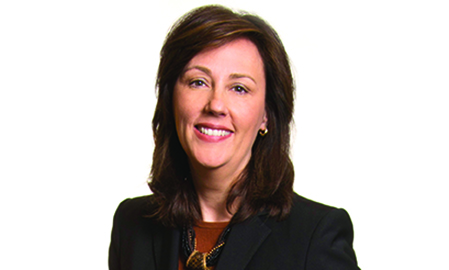Carrie Bourdow
Vice president, marketing, Cubist Pharmaceuticals
2011–2013
US marketing lead, hospital franchise, Merck & Co., Inc.
2008–2011
Executive director, customer marketing, Merck
Years ago, Carrie Bourdow was a young mother of two employed as a pharma sales rep. While challenged like anyone else by work/life balance, she enjoyed her burgeoning career “carrying the bag,” as she puts it, and was quite good at it. Professionally and personally, she was on her way.
And then, suddenly, she wasn’t. What was originally diagnosed as a bad flu bled into a severe case of pneumonia, one that rarely struck individuals her age with such intensity. She spent several weeks in intensive care, feeding and chest tubes affixed to her body. “My mom told me after the fact—the doctors sat down with her and had the ‘we’ve pretty much tried everything’ conversation,” she says.
Happily, her treatment team happened upon an antibiotic that worked where others hadn’t, and she went home a few days before Christmas. “It changed the way I thought about what I do for a living,” Bourdow adds. “I didn’t really appreciate what caregivers go through. It was what propelled me towards that hospital specialty.”
Nowadays, there’s no better place to advance that specialty than at Cubist. Hired several months ago as the company’s vice president, marketing, after serving as the marketing lead for Merck’s US hospital franchise, Bourdow arrived at a pivotal point in its evolution. For years, Cubist had basically been a one-drug company (not a terrible thing, since that one product, MRSA/MRSE drug Cubicin, recently achieved blockbuster status). Now, however, Cubist is ramping up to five antibiotic products, with a rich pipeline promising others soon. In the second half of 2013, it acquired Optimer Pharmaceuticals (and with it CDAD drug Dificid) and Trius Therapeutics (makers of skin infection drug Tedizolid, which was accepted for priority FDA review in December). All this led Jefferies analyst Eun Yang to note that Cubist “undoubtedly has the strongest anti-infective franchise in the drug industry.”
With that level of activity comes a commensurate level of expectations, but Bourdow seems suited to handle it. She was more or less born into the pharmaceutical business: her father owned and operated a pharmacy and her mother was a nurse who owned a medical supplies company. Some of her experience is slightly less on point: during her college years, she held a summer internship with the Clinton gubernatorial administration in Arkansas—and yes, she knows what you’re thinking when you hear that. “When you say ‘intern’ and ‘Clinton’ in the same sentence…,” she deadpans, her voice trailing off into a laugh.
More importantly, Bourdow knows the hospital business inside and out, a must for anyone working for a firm specializing in anti-infectives. That, in fact, might be a key competitive advantage for Cubist. “We know the customers and we know the reimbursement environment,” Bourdow says. To that end, upcoming Cubist campaigns will likely touch on the issues most important to individuals in and around the hospital environment, such as how the company’s anti-infective products can diminish lengths of stay as well as readmission rates.
While Bourdow can self-deprecate with the best of ’em—she refers to Cubist as “this small company in Lexington, Massachusetts”—there’s no question she appreciates the enormity of her mission, especially given rising levels of public concern. All of Cubist’s products treat conditions that have been classified by the CDC as either a serious or urgent threat. “Lots of people are raising alarms and ringing bells and talking about these serious infections,” Bourdow acknowledges, referring to a recent Forbes headline about an imminent “antibiotic apocalypse.”
So don’t expect Cubist to slow down. Bourdow says that the company has allotted $400 million for antibiotic R&D in 2014 and goes out of her way to note that additional acquisitions are a possibility. “It’s a real responsibility to be the global leader in the fight against antibiotic resistance. It’s an incredibly exciting time.”
From the March 01, 2014 Issue of MM+M - Medical Marketing and Media







